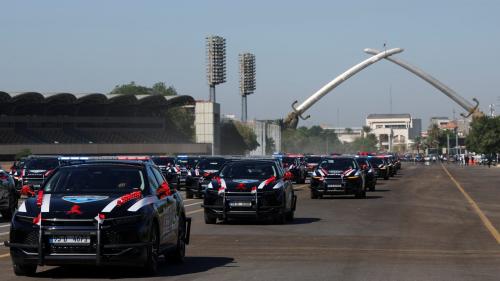Underlying the debate about the wisdom of the US-led intervention in Iraq lies the deeper issue of when, in an age of unconventional threats, to use military force and whether that force must meet some broadly accepted standard of “legitimacy”. Americans in this presidential election year remain deeply divided over this issue—as do their transatlantic allies and much of the rest of the world. These divisions will not disappear under a new US president, for they reflect the realities of today’s world far more than the desires of a particular American administration.
Debate—in the US and globally—over Iraq accentuated sharply different views on this critical issue. Two positions, equally unsatisfactory, have emerged. One holds that, except in a clear case of self-defence in response to an actual or tangibly imminent attack, the decision to use force requires explicit authorisation by the United Nations Security Council. The other argues that, in an age of large-scale terrorism, waiting for others to strike first is suicidal. The right to self-defence must include the right to act pre-emptively, before a real threat has fully materialised; this includes the right to act unilaterally when international organisations, notably the UN, fail to act.
Neither of these positions is sustainable. Giving the Security Council or any other international organisation an absolute veto would be unacceptable to many nations if they believed their vital security interests were at stake. Even when justification for the use of force is more complex, involving both security and humanitarian dimensions, as in Kosovo, the diversity of national perspectives on the Council may make a timely consensus difficult to achieve. Nor is it self-evident that lack of consensus on the Council renders a decision to act inherently illegitimate, given the Council’s now historically anomalous composition and the fact that some members themselves lack full democratic legitimacy.
The flaws of the UN system, however, go deeper than these procedural weaknesses. They include the very foundational principles of the system itself. The UN operates on the Westphalian assumption (enshrined in Article 2(4) of the UN charter) that the primary concern is aggression by one state against another, not what happens within states. Yet, in our increasingly interconnected world, the main threats to international security derive more from developments within states than from external behaviour of states. Indeed, the last three wars fought by the US, Britain and others were all in response to such internal developments—the ethnic cleansing of Albanians in Kosovo, the provision of a terrorist sanctuary in Afghanistan and the presumed development of weapons of mass destruction in Iraq.
It is increasingly difficult to square adherence to the principle of non-intervention with the evident need to forestall threats arising from internal developments. The Bush administration, well aware of this dilemma, has provided an answer that is equally inadequate. George W. Bush has insisted that Washington will not wait for a “permission slip” to act and will define for itself which internal developments constitute a sufficient threat to justify early intervention. Under this principle, however, any state that perceives a possible future threat from another state would be justified in intervening militarily. That is more a recipe for international anarchy than for international order. In practical terms, moreover, this policy may well prove self-defeating, as Iraq has shown. When a country acts without perceived international legitimacy, it will fail to rally the international support that is inevitably required to do the job properly.
The most pressing issue, then, is to devise both substantive rules and institutional arrangements to govern the use of force in this new era. Fashioning a new consensus will not be easy, as the continuing debate around the world makes evident. Even a November electoral victory by John Kerry, who, in his acceptance speech at the Democratic convention last week repudiated the more extreme versions of the doctrine of unilateral pre-emption, would not resolve the question, as the existing alternative is no more workable than the Bush doctrine.
Whoever wins the presidency should therefore make a concerted effort to forge a new international consensus on force and legitimacy. Aided, perhaps, by the work under way at the high level panel appointed by Kofi Annan, the UN secretary-general, to consider reform of the UN system, the goal of this effort must be to develop principles accepted by a broad range of nations with different perceptions of the threats we face today. Such common ground will be difficult to achieve, but we believe an appropriate starting point might lie in age-old concepts enshrined in the “just war” tradition (including principles governing the justification for going to war and actions that are justified in war). Further to this is the need for recognition that, even when a strong argument can be made for unilateral action, wide international support will render long-term success more likely.
Such an approach lacks the comfortable clarity of the black-and-white positions that characterise the current debate. Nor does it provide the simplicity of solutions that depend exclusively on either “procedural legitimacy” (what institution authorised the action) or substantive claims of justice (where the ends justify the means). But this pragmatic approach is far better suited to the evolving international environment, in which countries around the world are struggling to come to grips with how to address new threats ranging from catastrophic terrorism to genocide.
The Brookings Institution is committed to quality, independence, and impact.
We are supported by a diverse array of funders. In line with our values and policies, each Brookings publication represents the sole views of its author(s).



Commentary
Op-edNew Rules on When to Go to War
August 2, 2004